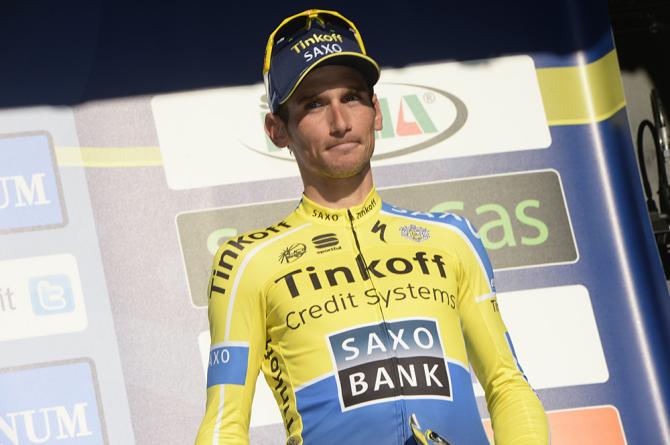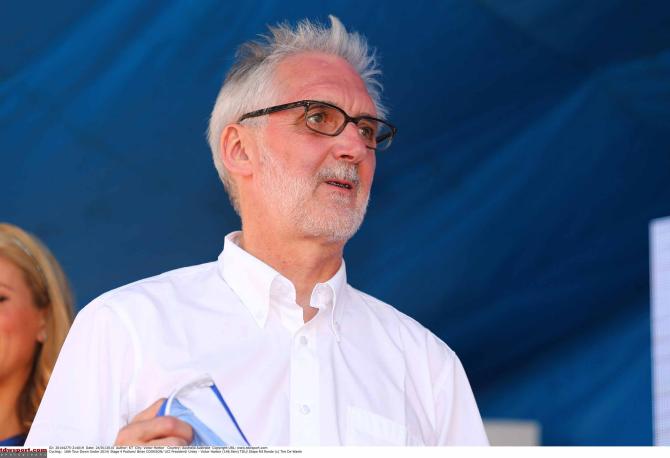Cookson: Passport cases can now be treated as positive tests
UCI president defends provisional suspension of Kreuziger



Brian Cookson and the UCI has taken the unprecedented step in treating Biological Passport cases as the equivalent of positive A-sample drug test after they provisionally suspended Roman Kreuziger.
The Tinkoff Saxo rider was given the sanction at the weekend after his team had attempted to race him in the Tour of Poland. The rider was handed his suspension less that 48 hours before the race started.
"There are very serious anomalies," Cookson told Cyclingnews when asked about Kreuziger's passport readings.
"The UCI and CADF experts have a very strong indication of manipulation. He has been invited to submit explanations. They've been submitted and they're not found to be convincing and we are now in a situation where we would have had to take disciplinary action very soon and we've done that as quickly as we could."
Kreuziger was sidelined on the eve of the Tour de France after he announced that anti-doping authorities had opened a biological passport case against him.
The anti-doping authorities had raised concerns over fluctuations in the rider's biological passport between March 2011 and August 2011, and between April 2012 through the end of the 2012 Giro d'Italia.
At the time, Kreuziger rode for Astana but made the switch to Tinkoff-Saxo at the start of the 2013 season.
The latest race content, interviews, features, reviews and expert buying guides, direct to your inbox!
Although Tinkoff Saxo removed him from the Tour line-up, they became frustrated with the UCI's handling of the case and scheduled to race the rider in Poland, a decision that set them on a collision course with the UCI. In the majority of the previous passport cases, such as Team Sky's former rider Jonathan Tiernan-Locke, the team took the decision to suspend their rider until the case had closed.
Cookson, speaking to Cyclingnews at the closing ceremony of the Commonwealth Games, acknowledged that the current proceedings in the Kreuziger case, and anti-doping passport violations in general, needed to become swifter.
"What I will say is that these things are taking too long to resolve, but what was particularly worrying about this case was that his own team withdrew him from the Tour de France because of the Biological Passport but then put him back into competition at the Tour of Poland. That was an extremely odd thing to do in my opinion. So what we've decided to do is look at all of these cases and treat them, if we can, as the equivalent to being an A sample positive test."
"So rather than these things going on and on for months and months with riders competing, we will look at each case very carefully and if we believe there is sufficient evidence to pursue a case we will in all likelihood put a provisional suspension, as if we would had it be a positive A sample."
"The problem with the passport cases is that they have gone one for too long. If a rider an A sample that tested positive then they are immediately suspended. If teams were willing to withdraw riders from competition when there were passport anomalies, as Tinkoff Saxo did with Kreuziger before the start of the Tour de France, then it's all well and good. However to put a guy back into competition when they had themselves taken him out of competition seems to us as not the right thing to do. It doesn't send out a good message to the rest of the world, so we're going to look at each of these cases individually now and the likelihood is that we will treat everyone as the equivalent of an A sample positive."
"The WADA code is clear but a little bit ambivalent on that point, but we want to make sure that we have a good case. It can't be right that someone who is very strongly suspected to have serious anomalies in the passport is allowed to compete indefinitely against riders who don't have that sort of problem."
Innocent until proven guilty?
The immediate question to Cookson's stance is how can the WADA code be both clear and ambivalent all at once? The Passport, from its launch was never designed to provide positive samples or results. Instead, its function was to deliver a set of long-term readings of a rider's blood parameters. Experts would then convey and a case may come as a result of anomalies.
The UCI have never lost a Passport case, but likening suspicion to the rather more clear-cut guilt from a positive test is a significant change of both policy and interpretation. "Well we are trying to be clear that the biological passport is a very useful tool. We do believe that it has resulted in much less doping abuse and problems in our sport. We are very confident in the way that it will stand up to any challenge in court. If a rider or team wants to challenge it legally then that's fine, but we believe that it's a strong and useful tool."
"And I'm not saying that he's guilty," Cookson told Cyclingnews.
"What I'm saying is that there's very serious concern and doubt has been raised by his Biological Passport. We think that continuing to allow him to compete by virtue of the constant spinning out of the explanations and challenges his legal team and experts are producing is not in the best interest of the sport. It's regrettable for Mr Kreuziger, but if his team had done the right thing, as they had for the Tour de France then we wouldn't be in the situation."
The process suffers from delays – a point that Tinkoff Saxo and the UCI would agree on. However, if, as Cookson asserts, Kreuziger is drawing out proceedings in order to delay a conclusion, he is doing so because he can and he has a legal right to defend himself after all.
"I don't know the detailed history of the case as I wasn't the president then, and one of the things that I have done is separate myself from the detail of the anti-doping process," Cookson asserts.
"So I wasn't aware that there was an issue with Mr Kreuziger until his own team made an announcement and removed him from competition. Now that I am aware then I think we need to look at how that process has managed to go on so long, and I think yes we need to find ways of speeding up that process."
Cookson believes that if a rider has a cloud hanging over them that they should be pulled from racing until that cloud clears. For case study, although it's not exactly the same, see Alberto Contador's 2010 clenbutorol case, in which the Spaniard bludgeoned the life out of the opposition at the 2011 Giro d'Italia only to lose the title after losing his appeal to CAS. "These things are frustrating and it's frustrating when the cycling world wants the president of the UCI to separate from the anti-doping process but then also expects us to be in the detail. We can't do it both ways. First of all it was a good thing that this team withdrew him from the Tour de France but I find it inexplicable that having done that they would put him back into competition when nothing had changed. As they've not kept him out, we've had to look at again, and we've had to do something about it."
Tinkov legal threats
While Kreuziger's case rumbles on Cookson may well have one eye on to the east with Russian team boss Oleg Tinkov taking to Twitter to threaten legal action against the UCI. It may all be bravado from a man who revels in the shock and awe 140 characters can deliver.
"Let me just say that my friend Oleg's Tweets are always entertaining," Cookson says with a wry smile.
"Sometimes his Tweets are amusing but I have noticed that they're not always factually based. If my friend Oleg decides to take the UCI to court we'll deal with that through our lawyers. We won't be intimidated into doing anything but the right thing in anti-doping cases and I don't think that it's an unreasonable expectation that teams should take their responsibilities seriously."
"In this instance that's what we've decided and we're going to look at all future cases to see if they should be pursued in the same way. It's not a definite once and for all though."
Daniel Benson was the Editor in Chief at Cyclingnews.com between 2008 and 2022. Based in the UK, he joined the Cyclingnews team in 2008 as the site's first UK-based Managing Editor. In that time, he reported on over a dozen editions of the Tour de France, several World Championships, the Tour Down Under, Spring Classics, and the London 2012 Olympic Games. With the help of the excellent editorial team, he ran the coverage on Cyclingnews and has interviewed leading figures in the sport including UCI Presidents and Tour de France winners.
